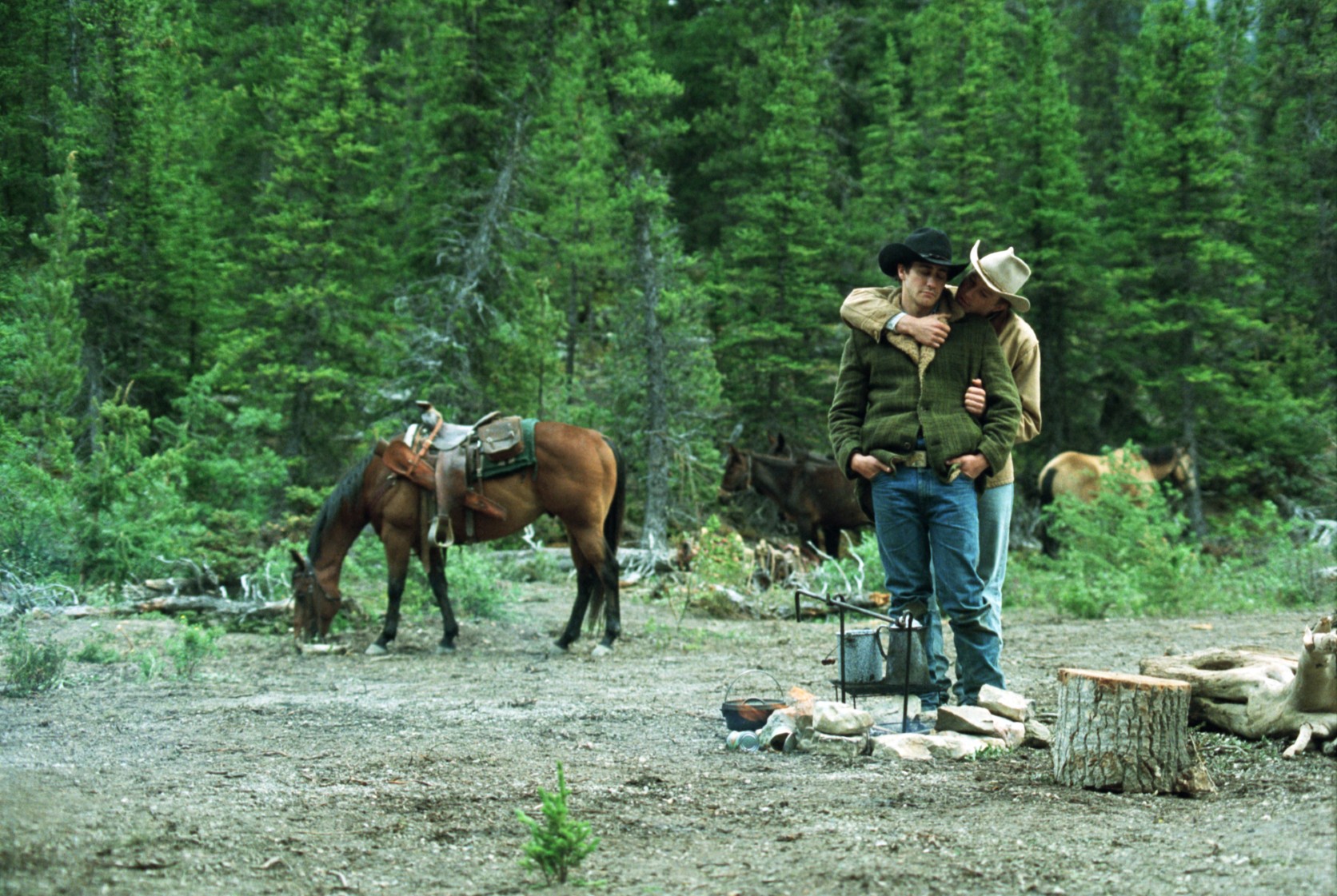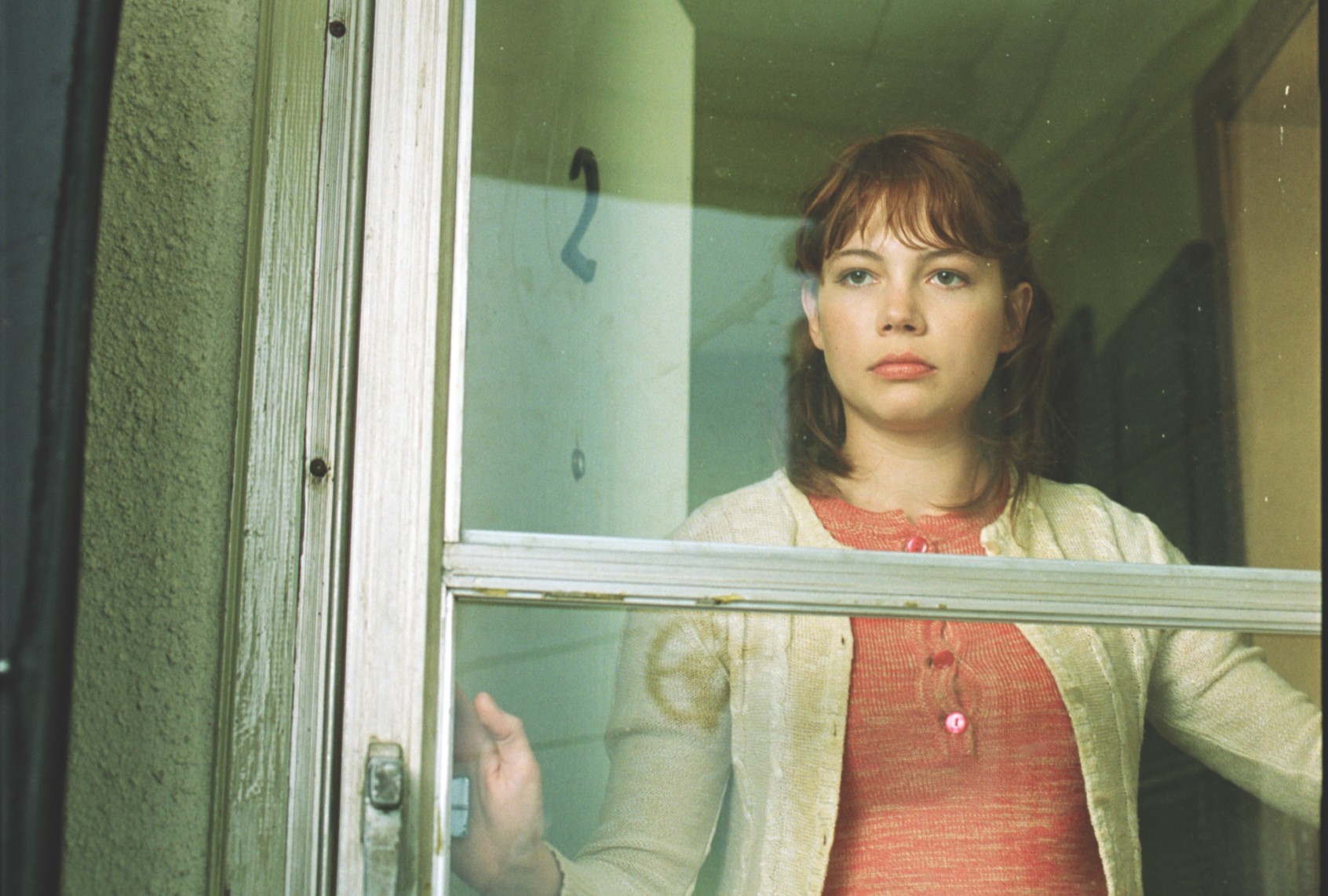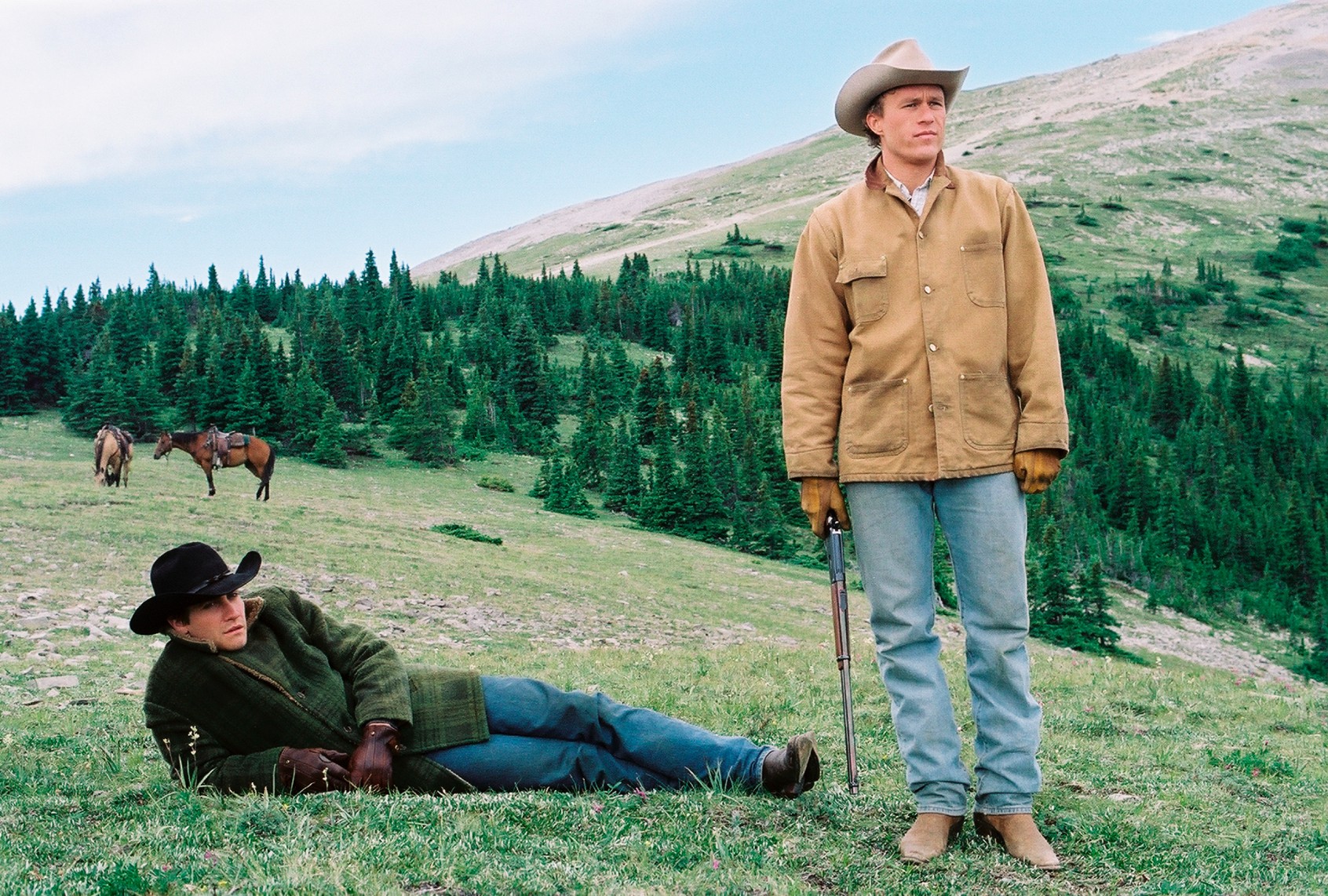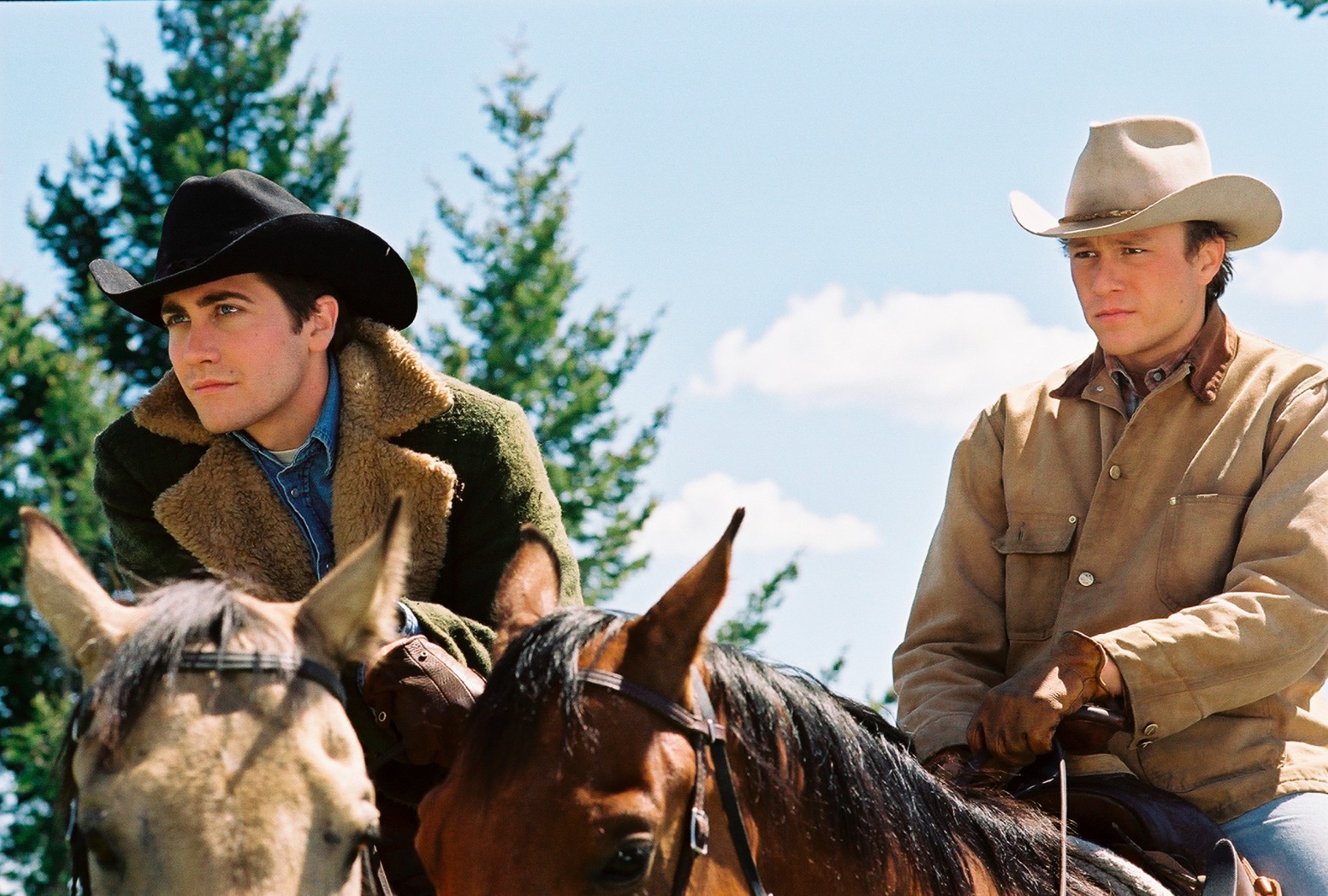When Ang Lee’s seminal film (no pun intended, don’t even get me started) “Brokeback Mountain” hit theaters in the winter of 2005, its unanimous critical praise instantly pushed up against a wall of off-color jokes, Hollywood controversy and intense cultural debate. Depending on who you asked, the film was either one of the most moving love stories to play on the big screen in years, or it was “the gay cowboy movie,” where Jake Gyllenhaal and Heath Ledger were taking their chances on a diet of little more than water and canned beans. Funny the first time, maybe, but it gets a little tired after the zillionth, especially taking into consideration that the movie is relatively tame when it comes to its depictions of gay sex, but wild and sprawling in its portrayal of decades-spanning true love. The conversation surrounding the film was inextricable from the movie itself; one necessitated the other. “Brokeback Mountain” was an unstoppable force meeting an immovable object. But no matter how obnoxious all of the hullabaloo was, it was a blessing in disguise. The non-stop hand-wringing turned “Brokeback” into one of the most important love stories ever made, still as relevant today as it was 20 years ago. As one of its stars, Michelle Williams, so astutely put it when recently asked about the movie losing its best picture nomination to “Crash”: “I mean, what was ‘Crash’?”
Now, two decades after its initial release, “Brokeback Mountain” is returning to theaters across the country for a special slate of anniversary screenings through June 25, ready for its theatrical reappraisal. Plenty has changed in 20 years, too. It’s not so unlikely to see a theatrical release for a film about two men falling in love. Queer people even have their own rom-coms now, with their own dedicated spaces for jokes that don’t involve canned legumes! But despite gay love stories being (somewhat) more common, there is still nothing quite like “Brokeback,” especially on the silver screen.
 Jake Gyllenhaal as Jack Twist and Heath Ledger as Ennis Del Mar in "Brokeback Mountain" (Kimberly French/Focus Features)
Jake Gyllenhaal as Jack Twist and Heath Ledger as Ennis Del Mar in "Brokeback Mountain" (Kimberly French/Focus Features)
“The theater was only a third full. People were very quiet. Normally, everyone’s talking to their neighbors. But I think everyone there was looking around, wondering, ‘Who’s here? Who do I have to be ready to explain to at church on Sunday that I was just checking ‘Brokeback’ out?’ You could tell that was what the vibe was: Who do I have to be prepared to make my excuses to?”
For David Clarke, a New York-based publicist who saw “Brokeback Mountain” during its original run at a small AMC theater in Texas, it was a singularly unforgettable experience. “I was closeted and engaged to a woman,” Clarke says, “and I was intrigued because it seemed like a really important moment was happening culturally.” Like many not-yet-out people in the early 2000s, including myself, Clarke positioned his curiosity as a form of allyship and was stunned by the tenderness he saw onscreen and the harsh realities that came with it. “At that time, the only real cinematic moments we had of queerness were like, ‘The Birdcage,’ ‘To Wong Foo…,’ ‘Priscilla, Queen of the Desert,” Clarke remembers. “But while the credits were rolling, people left the theater stunned. There wasn’t a lot of chatter. People walked out like, ‘What did I see?’ They thought they were going to see some version of [gay sex] in their face multiple times. But instead, they were forced to witness a hate crime. People didn’t really know what that looked like until they saw this movie.”
Clarke’s experience was patterned globally by people for whom “Brokeback” introduced an entirely different side of gayness. The film wasn’t poking fun at gay men, nor was it particularly raunchy. Instead, Lee’s film depicted the truth of the gay experience, which is that it’s just like the heterosexual one, with one big difference: At some point, no matter when you come out, your longing will have to happen in silence. This reality, painted with such quiet, heart-wrenching affection, is what gave “Brokeback” its lasting power through all the jokes and critiques; it’s what changed minds and opened hearts. And though it may be 20 years old, that essential generosity makes “Brokeback Mountain” the most pivotal film you can watch in theaters this summer.
Being 11 years old in 2005, I was not part of the R-rated moviegoing public when “Brokeback” first hit theaters. Back then, I was slightly more focused on maintaining an air of straightness at all times, made all the more difficult by puberty pushing the already-gay timbre of my voice up one whole octave for the next two years. But I was keenly aware of how the film was being talked about, and savored every positive conversation about it, even if I couldn’t yet live authentically myself. A few years later, after coming out to nothing but love and acceptance, the air surrounding “Brokeback” still felt intimidating. What was this film going to show, and what was it going to do to me? One night, after my parents were asleep, I watched it alone in the basement, not knowing what to expect. After all of those quips and memes that made up the movie’s legacy, the last thing I anticipated was to feel completely hollowed out, sobbing into a throw pillow.
 Michelle Williams as Alma in "Brokeback Mountain" (Kimberly French/Focus Features). But the element of surprise has always been the film’s strong suit. “Brokeback Mountain” is a slow-moving story of two cowboys, Ennis (Ledger) and Jack (Gyllenhaal), whose chance meeting while working together herding sheep as ranchhands one summer leads to a deeply felt, decades-spanning romance. As Jack and Ennis learn how to let their guards down around one another, the audience follows, led gently by Lee’s direction and Larry McMurtry and Diana Ossana’s screenplay into a love forged by recognition. Ennis and Jack understand one another. They see each other’s loneliness, fighting in the trenches of the ceaseless internal war that rages when trying to live in a world that hasn’t been built for you. In a sense, they are outlaws bound by their life on the run, and their love is more powerful than any distance.
Michelle Williams as Alma in "Brokeback Mountain" (Kimberly French/Focus Features). But the element of surprise has always been the film’s strong suit. “Brokeback Mountain” is a slow-moving story of two cowboys, Ennis (Ledger) and Jack (Gyllenhaal), whose chance meeting while working together herding sheep as ranchhands one summer leads to a deeply felt, decades-spanning romance. As Jack and Ennis learn how to let their guards down around one another, the audience follows, led gently by Lee’s direction and Larry McMurtry and Diana Ossana’s screenplay into a love forged by recognition. Ennis and Jack understand one another. They see each other’s loneliness, fighting in the trenches of the ceaseless internal war that rages when trying to live in a world that hasn’t been built for you. In a sense, they are outlaws bound by their life on the run, and their love is more powerful than any distance.
As Clarke describes it, “Brokeback Mountain” beautifully illustrates how so much gay yearning is done secretly, just out of pure necessity of safety. “Watching the movie, I saw embodiments of things I had gone through,” he says. “In seventh grade, there was a kid who lived up the street from me that I had a secret romance with. At school, we were straight-acting. But we would spend a lot of time together outside of school, and we had this very Ennis and Jack romance in a lot of ways. They were more adult than I was as a kid. But that longing that they had, the way that Jack would fantasize about them having a ranch in Mexico, I’d do that same thing with him: fantasizing about us together as adults, finding a way to make it work. I remember watching ‘Brokeback’ and just being like, ‘Holy sh*t.’ I was not expecting to see my life and things I felt on this screen.”
Start your day with essential news from Salon. Sign up for our free morning newsletter, Crash Course.
But what exactly to make of it at the time, Clarke wasn’t sure about, and neither was anyone else in his theater. “I was expecting it to be packed because there was so much buzz about the film,” he says. “But the theater was only a third full. People were very quiet, which is unusual. Normally, everyone’s talking to their neighbors. But I think everyone there was looking around, wondering, ‘Who’s here? Who’s seeing this movie? Who do I have to be ready to explain to at church on Sunday that I was just checking ‘Brokeback’ out? You could tell that was what the vibe was: Who do I have to be prepared to make my excuses to?”
“I don’t think I was expecting it to affect me as viscerally as it did. My gayness was not nascent at all at that point; I was already out. But I had never seen intimacy portrayed that way before, or a gay relationship explored with that depth before. I was like, ‘Oh, this does feel like I’ve been hit by a truck, emotionally.’”
Even in 2005, the words “Brokeback Mountain” had an instant connotation, different from person to person. And in the years since, so much emotion and reverence have been put upon the film that there’s almost too much to fit into the confines of a single reputation. Though it’s the paragon for gay romance films, the movie’s air of prestige has somewhat clouded its thematic resonance over the years. To a generation of queer people born around the time that “Brokeback” was first released, the movie’s name precedes its content.
“I knew it was the gay movie,” says Ethan Winograd, a musician and student at Chicago’s Loyola University. “I knew it was the gay cowboy movie. I knew somebody gets f*cked. I know it was historically significant. But other than that, I didn’t have any concept of what it was about. When ‘Call Me By Your Name’ came out, it really opened my eyes to the concept of gay cinema, and all of the stuff that came before it.” For Winograd, who saw the film during his freshman year of college, watching “Brokeback Mountain” didn’t come with the same trepidation that Clarke and everyone else at the local AMC had during their first viewing, but the reaction was the same. “I don’t think I was expecting it to affect me as viscerally as it did,” he says. “By the end, it definitely released something inside of me. My gayness was not nascent at all at that point; I was already out. But I had never seen intimacy portrayed that way before, or a gay relationship explored with that depth before. That was what really affected me. I was like, ‘Oh, this does feel like I’ve been hit by a truck, emotionally.’”
 Jake Gyllenhaal as Jack Twist and Heath Ledger as Ennis Del Mar in "Brokeback Mountain" (Kimberly French/Focus Features). Issy Kagan, a student living between New York and North Carolina, feels similarly. Like Winograd, Kagan’s first time watching “Brokeback Mountain” was on a laptop. But the size of the screen did little to diminish her love for the film. “I just knew it as this great, tragic love story,” she says about her perception of the movie growing up. “I always had an awareness of it, but watching it, I just loved it. The whole movie is a standout, but the scenes where Ennis and Jack are physically close, wrapped in each other, I can’t handle. It’s so intimate.”
Jake Gyllenhaal as Jack Twist and Heath Ledger as Ennis Del Mar in "Brokeback Mountain" (Kimberly French/Focus Features). Issy Kagan, a student living between New York and North Carolina, feels similarly. Like Winograd, Kagan’s first time watching “Brokeback Mountain” was on a laptop. But the size of the screen did little to diminish her love for the film. “I just knew it as this great, tragic love story,” she says about her perception of the movie growing up. “I always had an awareness of it, but watching it, I just loved it. The whole movie is a standout, but the scenes where Ennis and Jack are physically close, wrapped in each other, I can’t handle. It’s so intimate.”
When the anniversary screenings were announced, Kagan jumped at the chance to see the movie for the first time in a theater, and says that she’s excited to drag as many people as she can to one of the showings. “I'm bringing two of my childhood friends, who I’ve known for 15 years, neither of whom has seen it yet,” she says. “I’m really excited to put them on. Watching a movie with someone is a form of intimacy in its own regard, and I love watching other people watch movies, that’s my favorite thing.”
Now two decades removed from the closeted college student he was when he first saw “Brokeback Mountain,” Clarke is happily experiencing a “Brokeback”-level intimacy himself in his own committed relationship, instead of merely watching it play out on the big screen. And while he doesn’t specifically credit the movie with his coming out, Clarke does say that “Brokeback Mountain” planted a seed.
“When I saw the film as a 20-year-old, I was so terrified of seeing something so relatable that I didn’t want to touch it,” Clarke says. “It took a long time for me to come back to this movie. Once I finally found comfort with myself, I was able to revisit the film and appreciate it for what it was and what it is: So human and so beautiful.”
Read more
about impactful LGBTQ+ cinema


